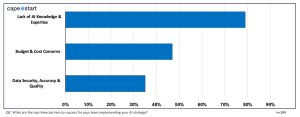The promise of Artificial Intelligence (AI) in life sciences is undeniable—offering advancements in drug discovery, clinical research, and evidence generation. Yet, many organizations still struggle to implement AI effectively. To better understand these challenges, CapeStart conducted a survey of 104 life science professionals, asking them:
What are the top three barriers to success for your team in implementing your AI strategy?
Findings from CapeStart’s Life Science AI Research Report share respondents’ perspectives on the challenges keeping them from realizing their AI-related goals. The responses revealed three primary obstacles: lack of AI expertise, budget constraints, and concerns around data security and quality.

Barrier #1: Lack of AI Expertise (79%)
The most frequently cited challenge—reported by nearly 8 out of 10 respondents—is the lack of expertise and knowledge. While AI is a rapidly evolving field, many life science professionals find it difficult to identify the right AI solutions, integrate them into existing workflows, and define success metrics.
Survey participants noted:
- “Lack of skilled talent, integration with existing systems, and defining clear success metrics.”
- “AI understanding outside of the IT org.”
- “Knowledge about ways to incorporate AI.”
For AI to truly drive value, organizations need to invest in training their teams, hiring AI experts, and fostering collaboration between data scientists and domain experts in life sciences.
Barrier #2: Budget & Cost Concerns (47%)
Nearly half of respondents cited budget limitations as a major roadblock to AI implementation. AI development often requires significant investment in infrastructure, skilled talent, and ongoing model training. Without clear Return on Investment (ROI) projections, securing funding can be a challenge.
Some direct feedback from respondents included:
- “Budget concern.”
- “Lack of resources/funding.”
Organizations can address this by starting with AI proof-of-concept (POC) initiatives to demonstrate tangible value before committing to full-scale implementation.
Barrier #3: Data Security, Accuracy & Quality (35%)
AI-driven insights are only as good as the data they are built upon. More than a third of respondents highlighted data security, accuracy, and overall quality as a significant challenge. Issues such as data silos, incomplete datasets, and lack of standardization make it difficult to train effective AI models.
Key concerns shared by respondents:
- “Data quality and availability.”
- “Limited quality of AI recommendations.”
- “Poor quality of deliverable.”
To overcome these concerns, life science organizations need robust data governance frameworks and investments in data harmonization and preprocessing to ensure AI models are trained on high-quality datasets.
Moving Forward: Overcoming AI Barriers in Life Sciences
Despite these challenges, AI adoption in life sciences continues to accelerate. To navigate these barriers, organizations should consider:
- Building AI literacy across teams to bridge the knowledge gap.
- Starting with small-scale AI pilots to demonstrate value before scaling.
- Investing in data management strategies to improve data quality and availability.
By addressing these hurdles, life sciences organizations can unlock the full potential of AI to drive innovation and improve patient outcomes.

